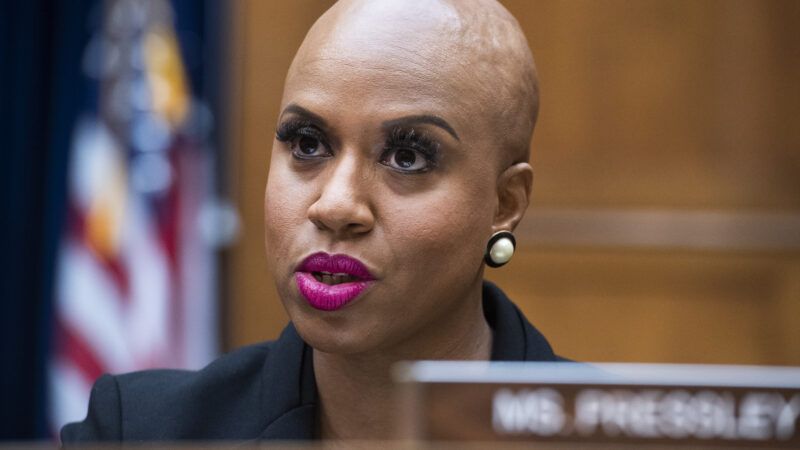Ayanna Pressley Revives Justin Amash's Bill To End Qualified Immunity
The Ending Qualified Immunity Act of 2021 would no longer let state actors violate your rights without consequence.

Rep. Ayanna Pressley (D–Mass.) has reintroduced a bill to end qualified immunity, a legal doctrine that makes it difficult for the public to hold government officials accountable for alleged misconduct.
Former Rep. Justin Amash (L–Mich.) originally unveiled the Ending Qualified Immunity Act in June 2020 after the police killing of George Floyd. Pressley signed on as cosponsor a few days after, though the bill died without ever receiving a vote.
The Ending Qualified Immunity Act of 2021, which Sens. Ed Markey (D–Mass.) and Elizabeth Warren (D–Mass.) are cosponsoring in the Senate, endeavors to do the exact same thing as its predecessor: abolish qualified immunity for all state actors.
The American public maintains the right to sue civil servants who violate their rights under Section 1983 of Title 42 of the U.S. Code. But the Supreme Court has radically limited that right over the years. First, there was the decision in Pierson v. Ray (1967), which held that public officials may avoid civil suits if constitutional violations were made in "good faith." In Harlow v. Fitzgerald (1982), the high court took that a step further: Victims may not sue state actors for misbehavior unless that misbehavior was "clearly established" in previous case law.
In other words, in order to have the right to bring a case before a jury, a plaintiff must be able to point to a court precedent that explicitly describes the situation in question to a tee. Qualified immunity has protected two cops who stole $225,000 while executing a search warrant, a cop who damaged a man's eye after allegedly kneeing him 20 to 30 times after he had been subdued, a prison guard who hid while an inmate raped a nurse, two cops who beat and arrested a man for standing outside of his house, a cop who ruined a man's vehicle during a bogus drug search, a cop who shot a 10-year-old, and a cop who shot a 15-year-old.
In all of those cases, the victims were left with no avenue for recompense.
"It is the sense of the Congress that we must correct the erroneous interpretation" of Section 1983, the bill says, "and reiterate the standard found on the face of the statute, which does not limit liability on the basis of a defendant's good faith beliefs or on the basis that the right was not 'clearly established' at the time of the violation."
The Supreme Court has demurred at the opportunity to fundamentally reevaluate the doctrine. But it has started to send messages to the lower courts that the current application of qualified immunity no longer cuts it. In November, it overturned an appeals court decision that awarded qualified immunity to a group of correctional officers who forced a naked inmate into two deplorable cells, one teeming with sewage and the other with "massive amounts" of human feces. And just last month, it reversed another appeals court decision that gave qualified immunity to a prison guard who had pepper-sprayed an inmate without provocation.
Lawmakers are poised to vote soon on the Justice in Policing Act, a reform bill that would end qualified immunity for cops. Pressley's bill eliminates it for all public officials—a relevant tidbit, when considering that the last two SCOTUS decisions on the issue pertained to correctional officers, not police officers. Moderate Democrats have begun backing away from that provision, however, in some cases because they face tough re-election challenges and want support from police unions.
Meanwhile, the GOP has largely resisted such reforms. Sen. Mike Braun (R–Ind.) did introduce a bill last summer that would have effectively paralyzed qualified immunity, but he abandoned it after scuffling with Fox News host Tucker Carlson. Amash's bill only boasted one Republican cosponsor, Rep. Tom McClintock (R–Calif.).
But the American public is on board. The majority of the country supports reform, with high-profile attempts gaining steam. Citing Reason's reporting on the issue, players from the NFL, MLB, and NBA urged Congress to support Amash's bill last June.
One big hurdle at the time was then-President Donald Trump, who said that qualified immunity reform would merit an automatic veto. Will President Joe Biden, who has said that he isn't ready to end the doctrine, be any better? His national press secretary told me during the campaign that he wants to see it "severely reined in." He did not provide details as to what that meant.


Show Comments (41)